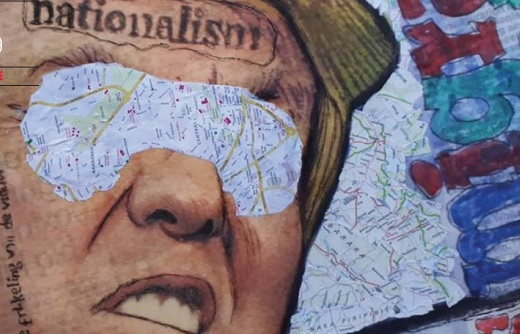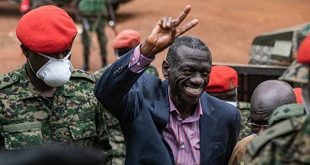
How Africans become invisible on the global stage
Kampala, Uganda | DOMINIC MUWANGUZI | Sane produces politically engaged art: the art that inspires conversation on ensuing political situations. He draws interest in his work with metaphors that satirically communicate the evils of the Capital Empire with its villains. He sardonically implicates world political leaders like Theresa May (British Prime Minister), Donald Trump (U.S President) and Queen Elizabeth II (Queen of Britain) because they infuse familiarity in his work. They are white faces everyone can relate to; archetypical of the incessant capitalistic excesses like corruption, racism, neo-colonialism, war and greed that subjugate the African continent. The artist is blant; declares that the continent’s socio-political misfortunes are naturally handed down to it by its oppressors: the western powers.
In spite of this adversity, Africans blissfully enjoy walking in the shadows of the oppressor. Sane writes, thus, ‘Black’ people live in the shadows of ‘white’ people and accept their position as living shadows for whiteness. Whiteness symbolises power in this age and for people like Blavatsky, in ages to come too. Yes, the artist is not asserting a novel experience here. It is obvious that Africans accept whiteness. Many whiten their skin and adopt western names as transformative symbol of newly acquired power or status. When African travel to the west, many ditch the mother tongue they have spoken for years.
This appetite to be someone else, while losing the true self, is destructive and has prompted the rise of puppet leaders, especially on the African continent. In his drawings, Sane paints familiar African leaders swinging as puppets for world leaders like Donald Trump whose political dogma involves white- nationalism. The collage printed photograph of Donald Trump wearing his traditional comic smile, with the word nationalism, emblazoned on his forehead, is symbolic of the creepy characteristic of arguably the world’s greatest leader that renders him a tragic character for the social-political development of the world. Is nationalism still a relevant ideology in this context of the new world order – globalisation-where national sovereignty is rapidly receding?
Sane adopts myriad collage texts from international newspapers and glossy magazines in his work to respond to the controversy and imagery these articles invoke in the respective communities they’re produced in and beyond. Here, he’s also concerned with the concept of moving histories from one part of the globe to the other; perhaps as a metaphor for a question; who writes history and where is Africa’s position in this global archiving? Is Africa visible, anyway? Apparently, collage is a European modernist technique used by artists like Picasso and working with it, especially in this body of work, echoes the notion of our living in the shadow of white people or the fixation to be white in these present times.
The exhibition `Shadows’ provides important perceptions into the political-social context of the Capital Empire to which Africa is clutching. As Africa seeks an outside identity of whiteness, has it consolidated its local identity? It’s a dilemma or uncertainty that makes black people on the continent susceptible to manipulation by powerful capitalistic nations or individuals who often are promoting their own interests.
`Shadows’ – a multi- disciplinary exhibition is showing from December 12 to January 2019 at Afriart gallery, Kampala. Eria “Sane” Nsubuga is a Phd student.
 The Independent Uganda: You get the Truth we Pay the Price
The Independent Uganda: You get the Truth we Pay the Price


